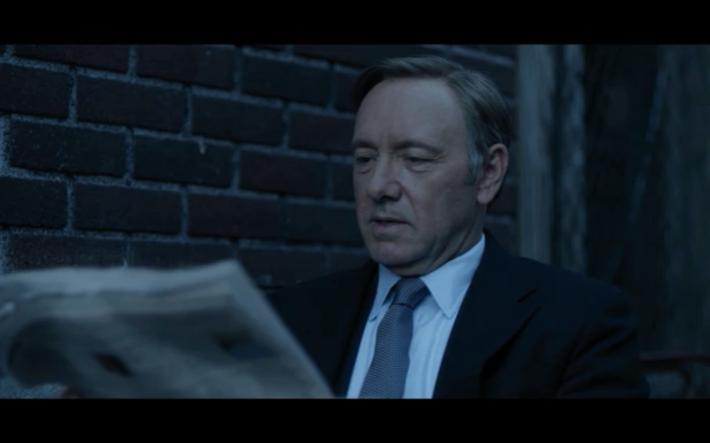It’s sometime recent, maybe even 2012. Congressmen Francis Underwood (D-SC [Kevin Spacey]) is in his home preparing to go to a celebratory ball for the new president-elect, Garrett Walker. He hears a car swerve, the sound of contact comes next. Underwood walks outside to see a dog badly injured, wheezing as it struggles to breathe. Without breaking a sweat, he gives the audience a little soliloquy about pain while calmly suffocating the animal with his bare hands. I mean, calmly; as calm as it gets. Oddly, like he’s done it before. Meet the focal point for our next 13 episodes.
Pilots are all about meeting the characters and setting the stage. So are introductory chapters in books or the first acts of a film or play. It’s unclear at this point which category House of Cards will ultimately fit into, but “Chapter 1” does its part by laying the groundwork.
Underwood is the current house majority whip, in line to be Secretary of State after utilizing his powers to book Walker’s presidential campaign. “Long time politician becomes the Secretary of State,” isn’t a very sexy log-line however, and within the episode’s first 10 minutes we get the moment that appears to set the whole series in motion.
Underwood walks into a meeting he believes is with Walker to discuss his diplomacy agenda (a Reagan-inspired “Trickle-down diplomacy” title). But only Chief of Staff Linda Vazquez is there to greet him. The Oval Office needs him to handle a split house and, in the short-term, push an education reform bill through Congress. Education reform is going to be a promise in the inauguration address—to be completed within the first 100 days—and the President needs a veteran to lead this. The Secretary of State promise is gone, Michael Kern will instead take the role. Underwood is clearly upset, but rather than put up a messy fight he eventually grits his teeth and will do whatever the President asks.
(Right. As film history tells us, a Spacey smirk means a plan is in place.)
But first, Underwood has some appearances to make. His wife, Claire [Robin Wright], joins him for an end of evening cigarette near their kitchen window, lamenting the state of things but not really feeling sorry. Simply acknowledging there are moves to be made. They attend a very political mass in the morning, then it’s to the symphony that evening.
And outside this performance is where the second major series-momentum incident occurs. Underwood steps outside to use his phone, and simply glances up when a younger woman passes by in a form-fitting, short, white dress. Meet Zoe Barnes [Kate Mara]—technically we’ve already met her in a cutaway scene, a young Washington Herald reporter unhappy with her lowly beat. But while Underwood leaves the symphony and plays some PS3 at home, Barnes returns to her apt. to sip wine from a coffee mug and read some e-mail. It’s not flagged for importance, but a Herald photographer caught the moment she passed Underwood and his eyes aren’t on the phone. Barnes suddenly has an idea to get off her lowly metro beat and she’s off to the Underwood house.
She’s somehow past Security Steve and knocks on the door before being approached. It’s enough to get us our first moment of Barnes and Underwood. And while the Congressman is quick to dismiss her, reminding her it’s late and she’s at his private residence, Barnes has a certain photo on her phone ready to show. C’mon inside, Ms. Barnes.
She’s got a low cut top on and has an end game in mind.
“It’s OK to look.”
“It’s cheap ploy.”
“Cheap but effective.”
Barnes doesn’t necessarily want sex, but needs a Washington insider—”Talk to me anonymously, I print what you say and never ask any questions.” If she doesn’t catch Underwood within a day of being kicked aside for Kern, maybe she’s already gone. But both individuals are aspiring for something more than their current situation and Barnes knows it. “You’d make a great Secretary of State.” It’s a perfect storm of circumstance and her appeal to ego keeps the conversation going. She wants to know the legislative agenda, but Underwood tests her a bit to see if Barnes is smart enough to put the pieces together on her own. She walks through the decision process for education reform being a top priority, and while Underwood won’t comment, he does ask for a night to think about this symbiotic opportunity and takes her card.
Up next that same evening is younger Congressman Peter Russo (D-PA [Corey Stoll]), we see him cheating on his secretary/girlfriend with a call girl as he’s clearly inebriated and driving home. Inevitably he’s pulled over, but mysteriously gets let out of the clink the next morning without any charges (and therefore any public attention to the incident).
The next day, Underwood meets with famed education thinker Donald Blythe—the man Walker wants as the face of his education reform bill. He’s an extremely leftist policy guy, and Underwood takes his draft and immediately dismisses it, tossing the bill into the shredder… He tells Blythe to get back to the drawing board.
Underwood meets with Catherine Durant (D—Somewhere in the South) next to ask if she’d be interested in being Secretary of State one day. Durant reads between the lines—does Underwood have some dirt on boy scout Kern?—but Underwood merely wants to know if she’s interested. Durant is experienced, more conservative than most Dems and (most important for Underwood), she was anti-Walker during the campaign.
Time for some clean-up now. Russo is called into Underwood’s office where we learn how he was so quietly excused from his problems the previous evening. In exchange for saving his political career, Underwood wants one thing: loyalty. Unblinking, unquestioned loyalty. (If counting, this is the third politician Underwood brings to his side throughout the episode—he’s planted the seed for Durant, blackmailed Russo and sends right hand man Doug Stamper to make an offer to the D.C. police chief—their support for his mayoral campaign in exchange for Russo—earlier in the hour.)
His next meeting is of the informal variety. He drops a half-shredded education reform bill draft to Barnes on a museum rendezvous. She’s got her frontpage story if she’s willing to put in the grunt work. (Note: From experience, transcribing is awful.)
The hour wraps up with Underwood watching the inauguration from a very close seat, attending the inauguration ball (with a few extra tickets he received from Vazquez for being a good sport), then heading for an early meal of ribs at his favorite greasy dive: Freddy’s. Southern guy needs as close to authentic as he can get, right? Freddy has opened the place up early for his longtime pal, and Underwood has brought the paper with him for a brisket breakfast. The two headlines above the fold: “Walker Takes Office.” “Education Bill Far Left of Center.”
Secondary storylines
With Russo, we get to see him early on as a bit of a frat-y member of Congress. His secretary/girlfriend Christina gets him out of an unwanted meeting by interrupting it with a phone call “from the President.” In reality, it’s Christina on the other line—telling him how badly she’d like his business right now. (He later tells her he wasn’t with anyone during the DUI incident… eeek).
With Claire Wright, she’s shown as the head of a major clean water non-profit in the DC area. Her organization has focused mainly on domestic affairs to this point, but she feels they’re plateauing and need to expand to international projects (like her husband, Claire clearly has ambitions and capabilities). Early in the episode she’s talking with her office manager about hiring for the initiative, later in the episode the convo turns into the need to free up parts of the budget and looming cost cutting (read: folks must go). No matter how much her sentimental office manager disagrees, Claire has another similarity with her husband based on this little evidence—she doesn’t let emotion get in the way of her plan.
Episode one is available to watch free of charge for a limited time. What’s everyone else think? Comment below or send a line.
Editor’s note: Pay attention to the headline here—”recap” not review. I had the pleasure of discussing how the production of House of Cards was different from other TV with showrunner Beau Willimon recently. He’s been repeatedly quoted with the “13-hour movie” mantra, that this isn’t paced like your typical TV drama and it isn’t necessarily meant to be watched that way. So while I’ll offer recaps (i.e. summaries) episode-by-episode if the demand exists, I’d prefer to do reviews after chunks assuming most people will binge watch. Perhaps every three episodes. (Reviews, by my definition, are a more opinionated look at a piece of art, trying to draw out the bigger ideas it may address of bring about.)



Thanks for the recap, it helped a lot!! Please continue to post for future episodes.
what she (^) said!
This is exactly what I was looking for. Thank you!! I hope there are more for future episodes!
this is so helpful, i’m new to american politics so good to be clear on all the positions!
Great recap; keep up the good work!
Nice recap; Love it!!
Appreciate all the encouragement folks, have enjoyed getting back into S1 of the show in order to work up to S2. Love how intricate Underwood’s dealings are (though I definitely recognize how complicated it makes the plot at times, it’s fascinating to watch how calculating that character is).
Reblogged this on alexlapushneanu and commented:
este un mare spectacol. Netflix a făcut o treabă perfectă
Not sure if anyone will see this, but ! I am confused as to why Spacey wanted the education reform let out to the public. What good will it bring to his ‘plan’? Thanks :>